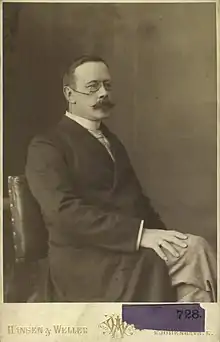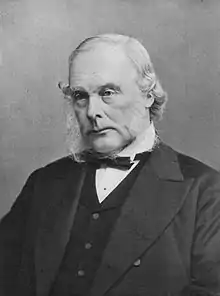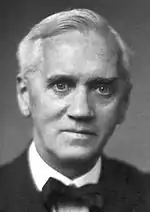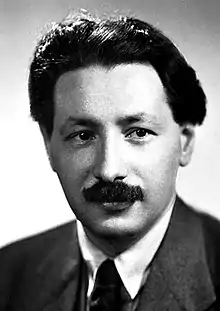List of microbiologists
Major contributions to the science of microbiology (as a discipline in its modern sense) have spanned the time from the mid-17th century to the present day. The following is a list of prominent microbiologists who have made significant contributions to the study of microorganisms. Many of those listed have received a Nobel prize for their contributions to the field of microbiology. The others are typically considered historical figures whose work in microbiology had a notable impact in the field. Those microbiologists who currently work in the field have been excluded unless they have received recognition beyond that of being on the faculty in a college or university.
Proto-microbiologists (pre-1670s)
Microbiologists
| Birth - Death | Microbiologist | Nationality | Contribution summary | |
|---|---|---|---|---|
| 1632–1723 | ._Natuurkundige_te_Delft_Rijksmuseum_SK-A-957.jpeg.webp) |
Antonie van Leeuwenhoek | Dutch | Considered to be the first acknowledged microscopist. Van Leeuwenhoek was the first to observe microscopic organisms, using simple single-lensed microscopes of his own design.[1] |
| 1729–1799 |  |
Lazzaro Spallanzani | Italian | Proved that bacteria did not arise due to spontaneous generation by developing a sealed, sterile broth medium.[2][3] |
| 1749–1823 |  |
Edward Jenner | English | Developed vaccination techniques against smallpox.[2] |
| 1818–1865 |  |
Ignaz Semmelweis | Hungarian | Demonstrated that doctors washing their hands with chlorine solutoin significantly reduced mortality of women giving birth in the hospital setting.[4] |
| 1853–1938 |  |
Hans Christian Gram | Danish | Developed the Gram stain used to identify and classify bacteria.[2] |
| 1845–1922 |  |
Charles Lavaran | French | 1907 Nobel Prize in Physiology or Medicine for discovering the causative agents of malaria and trypanosomiasis.[2] |
| 1827–1912 |  |
Joseph Lister | English | Introduced sterilisation techniques to surgery.[2][5] |
| 1822–1895 |  |
Louis Pasteur | French | Seminal discoveries in vaccination, food safety, and microbial fermentatoion. A key proponent of the germ theory of disease.[2] |
| 1850–1934 |  |
Fanny Hesse | German | Developed agar for use in culturing bacteria.[2][6] |
| 1851–1931 |  |
Martinus Beijerinck | Netherlands | Discovered the first virus as well as bacterial nitrogen fixation and sulfate reduction. |
| 1885–1948 | Marjory Stephenson | British | Pioneer of bacterial metabolism. | |
| 1871–1957 |  |
Kiyoshi Shiga | Japanese | Discovered a bacterium causing an outbreak of dysentery.[2][7] |
| 1854–1917 |  |
Emil Adolf von Behring | German | 1901 Nobel Prize for Physiology or Medicine for discovering diphtheria antitoxin.[8] |
| 1857–1932 |  |
Sir Ronald Ross | British | 1902 Nobel Prize in Physiology or Medicine for discovering that malaria is transmitted by mosquitoes[9] |
| 1843–1910 |  |
Robert Koch | German | 1905 Nobel Prize in Physiology or Medicine for work on tuberculosis; identified causative agents of tuberculosis, cholera, and anthrax.[10] |
| 1845–1922 |  |
Charles Louis Alphonse Laveran | French | 1907 Nobel Prize in Physiology or Medicine for recognizing parasitic protozoa as the causes of malaria and African sleeping sickness.[11] |
| 1857–1940 |  |
Julius Wagner-Jauregg | Austrian | 1927 Nobel Prize in Physiology or Medicine for discovering the neurosyphilis could be treated by inducing fever with malaria parasites.[12] |
| 1866–1936 |  |
Charles Jules Henri Nicolle | French | 1928 Nobel Prize in Physiology or Medicine for determining that typhus is transmitted by body lice.[13] |
| 1895–1964 |  |
Gerhard Domagk | German | 1939 Nobel Prize in Physiology or Medicine for the discovering the first commercially available antibiotic: prontosil.[14] |
| 1881–1955 |  |
Sir Alexander Fleming | Scottish | 1945 Nobel Prize in Physiology or Medicine for discovering penicillin.[15] |
| 1906–1979 |  |
Sir Ernst Boris Chain | British | |
| 1898–1968 |  |
Howard Walter Florey | Australian | |
| 1899–1972 |  |
Max Theiler | South African | 1951 Nobel Prize in Physiology or Medicine for developing a vaccine against yellow fever.[16] |
| 1888–1973 |  |
Selman Abraham Waksman | American | 1952 Nobel Prize in Physiology or Medicine for identifying streptomycin and other antibiotics.[17] |
- Ilan Chet (born 1939), Israeli microbiologist, professor, and President of the Weizmann Institute of Science
- Pauline Johnson, immunologist
References
- Lane, Nick (6 March 2015). "The Unseen World: Reflections on Leeuwenhoek (1677) 'Concerning Little Animal'." Philos Trans R Soc Lond B Biol Sci. 2015 Apr; 370 (1666): 20140344. [doi:10.1098/rstb.2014.0344]
- Pommerville, Jeffery C. (2014). Fundamentals Of Microbiology. Burlington, Massachusetts: Jones and Bartlett Learning. ISBN 9781449688615.
- dictionary of medical eponyms: Whonamedit - dictionary of medical eponyms, accessdate: September 9, 2015
- "Ignaz Semmelweis (1818-65)". London, UK: Science Museum, London-Brought To Life, Exploring the History of Medicine. Retrieved 2015-09-07.
- "Joseph Lister (1827-1912)". London: Science Museum, London-Brought To Life, Exploring the History of Medicine. Retrieved 2015-09-07.
- Walter and Fanny Hesse: Walter and Fanny Hesse, accessdate: September 9, 2015
- A. F. Trofa, H. Ueno-Olsen, R. Oiwa, M. Yoshikawa: Dr. Kiyoshi Shiga: Discoverer of the Dysentery Bacillus. In: Clinical Infectious Diseases. 29, 1999, S. 1303, doi:10.1086/313437.
- "The Nobel Prize in Physiology or Medicine 1901". Nobel Foundation. Retrieved 2015-09-07.
- "The Nobel Prize in Physiology or Medicine 1902". Nobelprize.org. 2014. Retrieved 2015-09-07.
- "The Nobel Prize in Physiology or Medicine 1905". Nobelprize.org. 2014. Retrieved 2015-09-07.
- "The Nobel Prize in Physiology or Medicine 1907". Nobel Foundation. Retrieved 2015-09-07.
- "The Nobel Prize in Physiology or Medicine 1927". Nobel Foundation. Retrieved 2015-09-07.
- "The Nobel Prize in Physiology or Medicine 1928". Nobel Foundation. Retrieved 2015-09-07.
- "The Nobel Prize in Physiology or Medicine 1939". Nobel Foundation. Retrieved 2015-09-07.
- "The Nobel Prize in Physiology or Medicine 1945". Nobel Foundation. Retrieved 2015-09-07.
- "The Nobel Prize in Physiology or Medicine 1951". Nobel Foundation. Retrieved 2015-09-07.
- "The Nobel Prize in Physiology or Medicine 1952". Nobel Foundation. Retrieved 2015-09-07.
This article is issued from Wikipedia. The text is licensed under Creative Commons - Attribution - Sharealike. Additional terms may apply for the media files.